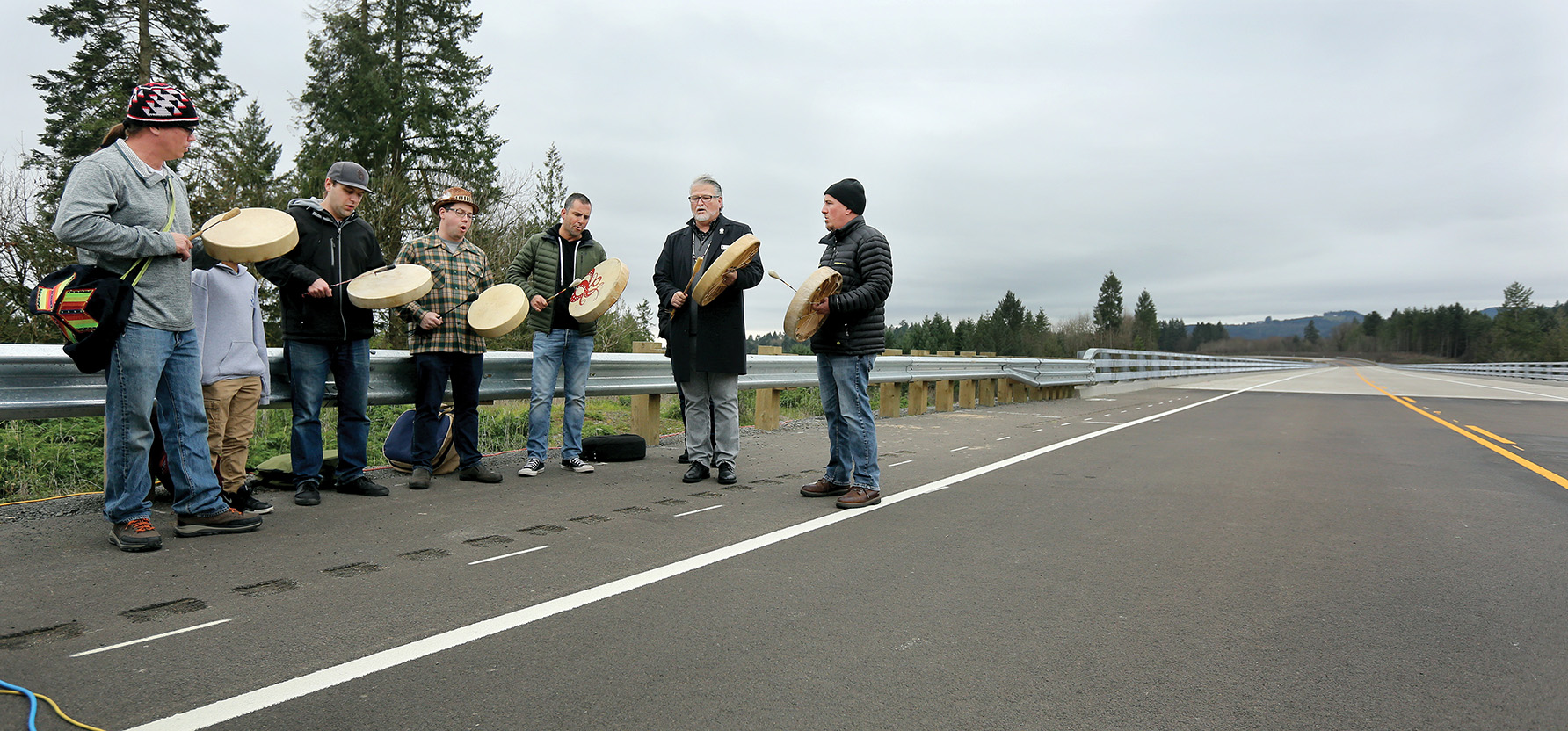Tribal Government & News
Tribe helps celebrate Phase 1 completion of Newberg-Dundee Bypass

By Danielle Frost
Smoke Signals staff writer
NEWBERG -- The Newberg-Dundee Bypass’s first phase is finally complete, thanks in part to a $4 million donation made to the project by the Confederated Tribes of Grand Ronde.
Local, state and federal officials and Tribal Council members and staff gathered on the bypass on Monday, Dec. 18, to celebrate the completion of the project’s first phase that is literally decades in the making. The first section of the bypass will officially open to traffic on Saturday, Jan. 6, but the ribbon cutting was held earlier due to the holidays.
The Tribal funds, originally designated in its gaming compact with the state to help build a new interchange at the convergence of state highways 18 and 22, helped Yamhill County and three of its city governments – Newberg, Dundee and McMinnville – fund their $20 million share of Phase 1 of the project, which also included $192 million from the state and $45 million from the federal government.
Tribal Council Vice Chair Chris Mercier spent more than eight years as a representative on the Yamhill County Parkway Commission, a group that has been advocating for the bypass since the 1980s. He was one of the featured speakers at the ribbon-cutting event, which also included Gov. Kate Brown and Oregon Department of Transportation Director Matt Garrett.
“It felt really cool to put my pickup on this road today,” Mercier said to chuckles from the audience. “This is pretty personal for me, and not just because I attend night classes in Portland twice a week. I got involved with the bypass committee when I was 29 years old and six months into my council career, and knew very little about local governments or transportation issues. I’m now 42. Being a part of this whole project and process has been a learning experience for me.”
Mercier is well-versed with the gridlock commuters face going through Newberg and Dundee while driving to the coast, Spirit Mountain Casino and Portland.
“I have gotten the sense that people really appreciate the Tribe’s involvement in this project, and that in turn meant a lot to the Tribe. … The Tribe was restored to improve the lives of its members, but that’s not the only reason. Tribes are also meant to help the communities in which we reside. We had a lot of support from the non-Tribal, local community during Restoration efforts. Without their support, the process of being restored would have been much harder.”
Mercier called the bypass a win for local and state government, as well as Indian Country.
“I’m hoping it will be held as an example (to others),” he said. “Tribes should be working more with their local and state governments. Gaming is meant to benefit the community.”
Also in attendance were Tribal Council member and current Parkway Committee representative Denise Harvey, and Tribal Council Secretary Jon A. George.
Tribal Economic Development Administrative Assistant Meghan Zimbrick and Public Affairs Administrative Assistant Chelsea Clark provided treats, beverages and small prizes to attendees.
The ceremony opened with a drum song by the Grand Ronde Canoe Family drummers and singers, which included George, Mercier, Tribal Cultural Resources Department Manager David Harrelson, Tribal Cultural Education Coordinator Jordan Mercier, Tribal Interpretive Coordinator Travis Stewart, Tribal Cultural Education Specialist Brian Krehbiel, Tribal youth Red Sky Clawson and Clark.
Tribal Attorney Rob Greene also attended the event.
“I want to thank all of the folks here for the patience they have shown,” Garrett said in his opening comments. “It is not lost on the Oregon Department of Transportation. … We deeply appreciate it and applaud your perseverance. Every step required sacrifice, commitment and passion. … Now, we have four miles of new roadway and 10 new bridges, done on time and under budget, and it will significantly reduce congestion on local roads and enhance the region’s transportation system.”
Brown said she likes to describe the bypass project as the “communities that could.”
“Today’s grand opening is truly a community celebration,” she said. “Now, we are ready to set our sights on phase two. This Newberg-Dundee Bypass is expected to reduce overall local traffic by 30 to 40 percent, and heavy truck traffic ODOT estimates will be reduced between 50 to 70 percent. … A well-managed transportation system is the backbone of the economy.”
Other speakers at the event included Newberg Mayor Bob Andrews, Dundee Mayor David Russ, McMinnville Mayor Scott Hill, state and federal representatives, and Yamhill County Parkway Committee Chair Dave Haugeberg, who has been a driving force behind the project since the late 1980s.
“The credit here really does go to the people of Newberg, Dundee, McMinnville and the Confederated Tribes of Grand Ronde,” Haugeberg said. “To give to this project, they had to give up other things, like local road improvements. They paid a price, and it was an incredible commitment. This is very unique, and the people of this region never gave up. … As I listened to that drum song today, I thought of those who were here first. They were the forefathers of the Confederated Tribes of Grand Ronde. If they were to look at our parkway today, I think they would be impressed with how it has come about.”
